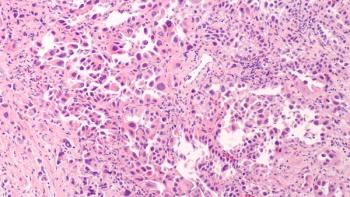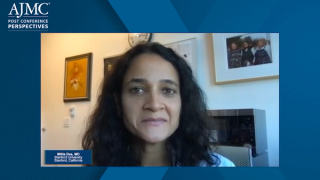
Small Cell Lung Cancer
Latest News

Dr Mark Socinski Discusses the Impacts of Immunotherapy on Lung Cancer Outcomes

What We’re Reading: Medicaid Coverage Errors; Gender Disparities in Health Research; Improved Lung Cancer Survival Rates
Latest Videos

More News

The American Cancer Society expanded eligibility for lung cancer screening; experts advised patients to do their research before choosing a plan from the Affordable Care Act’s insurance marketplaces; Republican-led states partnering with rideshare companies for medical appointment rides.

Central nervous system (CNS) progression was reduced with osimertinib plus chemotherapy for patients with EGFR-mutated non-small cell lung cancer plus CNS metastases.

Erin Gillaspie, MD, MPH, FACS, a faculty member of Vanderbilt University Medical Center’s (VUMC's) department of thoracic surgery, discussed trials that helped lung cancer surgeries evolve.

The results of CheckMate 77T showcase the improved event-free survival for patients with resectable non–small cell lung cancer who receive nivolumab in both the neoadjuvant and adjuvant setting and may have practice-changing implications.

The anti–PD-1 agent pembrolizumab was granted a new indication to treat patients with resectable non–small cell lung cancer (NSCLC) as a neoadjuvant treatment with chemotherapy and continued as adjuvant treatment after surgery.

School nurses play an overworked and understaffed role; Merck's immunotherapy Keytruda (pembroilzumab) has been granted approval for pre- and postsurgical treatment in lung cancer; the FDA is helping to curb tobacco-related health disparities.

Patients with distant recurrent non–small cell lung cancer (NSCLC) had significantly better overall survival (OS) than patients who had de novo disease.

Following discussions with FDA, Takeda will voluntarily withdraw mobocertinib in the United States for adult patients with EGFR exon 20 insertion mutation–positive, locally advanced or metastatic non–small cell lung cancer (NSCLC) based on the outcomes of the phase 3 EXCLAIM-2 trial.

Erin Gillaspie, MD, MPH, FACS, a faculty member of Vanderbilt University Medical Center’s Department of Thoracic Surgery, discusses new technologies making surgery on lung cancer tumors easier and expresses what currently excites her within the lung cancer space.

Adjuvant therapy, instead of just surgery alone, for early-stage non-small-cell lung cancer (NSCLC) after surgery incurs lower medical costs than surgery alone.

On this episode of Managed Care Cast, we speak with the senior author of a study published in the September 2023 issue of The American Journal of Managed Care® on the importance of adequate and effective lung cancer risk factor documentation to determine a patient's eligibility for screening.

Erin Gillaspie, MD, MPH, FACS, a faculty member of Vanderbilt University Medical Center’s Department of Thoracic Surgery, explained what testing needs to be done to identify the best treatment for patients with lung cancer.

Women have a higher likelihood of having hormone receptor (HR+) non-small cell lung cancer (NSCLC) than men, and mutations of EGFR and KRAS were more common in HR+ NSCLC in a recent study.

Osimertinib administered in addition to chemotherapy showed more progression-free survival (PFS) benefit than just osimertinib in patients with epidermal growth factor receptor–mutated (EGFRm) advanced non–small cell lung cancer (NSCLC).

Patients with advanced or metastatic non–small cell lung cancer (NSCLC) were able to specify a 1-point threshold when describing meaningful symptom change, for better or worse, that helped illustrate their symptom experience.

Erin Gillaspie, MD, MPH, FACS, a faculty member of Vanderbilt University Medical Center’s Department of Thoracic Surgery, discussed improvements in lung cancer outcomes due to new screenings and therapies.

Investigators wanted to analyze the diagnostic performance of methylation-sensitive restriction enzyme digestion followed by sequencing using cell-free DNA and explore the cancer signal origin of the cancer using DNN analyses for colorectal and lung cancers.

Removal of pulmonary function tests (PFTs) might exacerbate disparities for African American patients with lung cancer.

Certain immune cell types are associated with immune checkpoint inhibitor (ICI) response in patients with non–small cell lung cancer (NSCLC).


Patients with non-small cell lung cancer (NSCLC) with a high risk of brain metastases might feasibly be identified through machine-learning models, according to a recent study.

Patients with RET fusion-positive advanced or metastatic non–small cell lung cancer had a survival benefit when treated with selpercatinib in the LIBRETTO-431 study.

The process from referral to the lung cancer screening (LCS) process is a crucial point for Black veterans and may serve as a point of improvement, according to a study.

In an interview with Targeted Oncology, Sagun Shrestha, MD, evaluated new developments and clinical trials for patients with extensive-stage small cell lung cancer.

Coverage from the Institute for Value-Based Medicine event in Atlanta, held in partnership with Winship Cancer Institute of Emory University.












